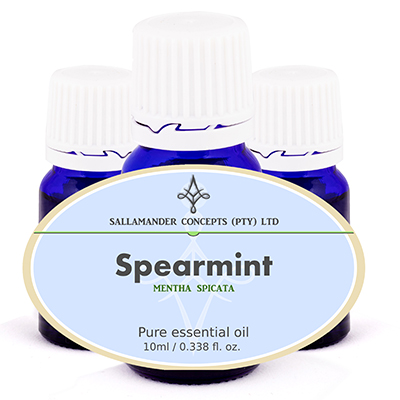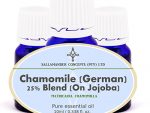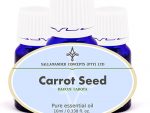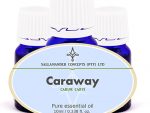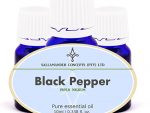Information on Spearmint essential oil
Spearmint essential oil is extracted from Mentha spicata (also known as Mentha viridis) of the Labiatae family and is also known as common or garden spearmint and spire, green, lamb, pea and fish mint.
Although not as popular as peppermint oil, Spearmint essential oil is far gentler to use with children and has great benefits on the digestive system and relieves flatulence, constipation, vomiting and nausea, as well as the respiratory tract to relieve cough, bronchitis, asthma, catarrh and sinus.
On the skin it calms itching and has a stimulant action on the mind.
Oil Properties
Spearmint essential oil has a similar aroma to that of peppermint oil, but is slightly sweeter and is pale yellow to greenish in color.
Origin
It is a native of the Mediterranean area, and is a hardy perennial herb that reaches about 1 meter (3 feet) in height and has bright green lance-shaped, sharply serrated leaves and pink or lilac-colored flowers.
Unlike peppermint, spearmint does not contain high amounts of menthol.
The ancient Greeks used it to scent their bath water and it had a reputation for curing sexually transmitted diseases like gonorrhea. During the medieval times it was used to heal sore gums and also to whiten teeth.
Extraction
Spearmint essential oil is extracted by steam distilling the flowering tops.
Chemical composition
Some of the main chemical components of spearmint oil are (-_-Carvone, (+)-Limonene, β-Myrcene, (Z)-Dihydrocarvone, 1,8 Cineole
Precautions
There is some concern in literature that Spearmint oil carries a rare risk of skin and mucous membrane irritation, but this can be avoided by keeping dilution rates low.
Spearmint essential oil has GRAS status.
As with most essential oils, this essential oil should be kept in a dark and cool place and should be stored in an airtight glass bottle (Preferably in the fridge at a temperature of around 4° Celsius / 39° Fahrenheit).
Please read our page with heading: Safety with Essential Oils before using this oil.
We recommend the following book as an excellent resource regarding safety:
Essential Oil Safety: A Guide for Health Care Professionals by Robert Tisserand & Rodney Young (#ad)
Therapeutic properties
The therapeutic properties of spearmint oil are antiseptic, antispasmodic, carminative, cephalic, emmenagogue, insecticide, restorative and stimulant.
For our glossary and explanation of these therapeutic terms, please click here
Uses
When your mind is tired and in need of stimulating and upliftment, then spearmint oil is the one for you, and although it has many properties in common to that of peppermint oil, it contains only small amounts of menthol and is far less harsh on the skin and ideal for use in children.
It is very useful to deal with digestive problems including flatulence, constipation, diarrhea and nausea, as it relaxes the stomach muscles and also relieves hiccups.
It helps with headaches, migraines, nervous strain, fatigue and stress, as well as for the respiratory tract; helping with asthma, bronchitis, catarrh and sinusitis.
On the skin it can relieve the itching of pruritus and helps with acne, dermatitis, congested skin and sore gums.
For female health it can help to stem the flow of heavy periods and leucorrhoea and releases urine retention.
Burners and vaporizers
In vapor therapy, spearmint oil can be used for vomiting, colic, flatulence, headaches, migraines, nervous conditions, asthma, bronchitis, sinusitis and catarrh.
Blended in Massage Oil or in the Bath
Used as a blended massage oil or diluted in the bath, spearmint oil helps with headaches, migraines, stress, fatigue, sinusitis, asthma, bronchitis and nervous conditions and to relieve itching.
Blended in a Cream
When spearmint essential oil is used in a cream or lotion it can help for itching – specially in cases of pruritus or when scabs have formed, decongesting the skin and to a lesser degree acne as well.
Suggested Dilution Rates
On the skin
Adult:
Face: 0.5% to 1.5%
Body: 0.5% to 1.7%
Bath: 0.5% to 1.7%
3 to 24 months:
Face: Maximum of 0.25%
Body: Maximum of 0.25%
Bath: Maximum of 0.25%
2 to 6 years:
Face: 0.255% to 0.75%
Body: 0.5% to 1%
Bath: 0.5% to 1%
6 to 15 years
Face: 0.5% to 1%
Body: 0.5% to 1.5%
Bath: 0.5% to 1.5%
Pregnancy
Face: 0.5% to 1.5%
Body: 0.5% to 1.5%
Bath: 0.5% to 1.5%
- When in doubt consult your doctor / medical professional before use.
- Most professionals and/or Aromatherapists will always err on the side of safety when giving advice regarding the use of essential oils and oleo resins during pregnancy.
- Quite a number of Aromatherapists advise that you should avoid all essential oils completely while pregnant, specifically during the first trimester. This is a very safe approach but may not be necessary at all.
Diffusers and Vaporisers
4 to 8 drops
General:
- When using for the first time – Always use the lowest dilution rate and build up slowly to the maximum. Stop using all essential oils on the skin if irritation or allergy occurs.
- Any advice or instruction received from a medical professional ALWAYS supersedes recommendations or advice found on this website. When in doubt consult your doctor / medical professional.
Summary
Spearmint essential oil can be effective for the digestive system, for the respiratory tract, for a tired mind and for skin problems. Rare reports of skin and mucous membrane sensitivity recorded.
Blends
Although most essential oils blend well together, Spearmint oil blends particularly well with Basil, Eucalyptus, Lavender, Rosemary and Jasmine.

